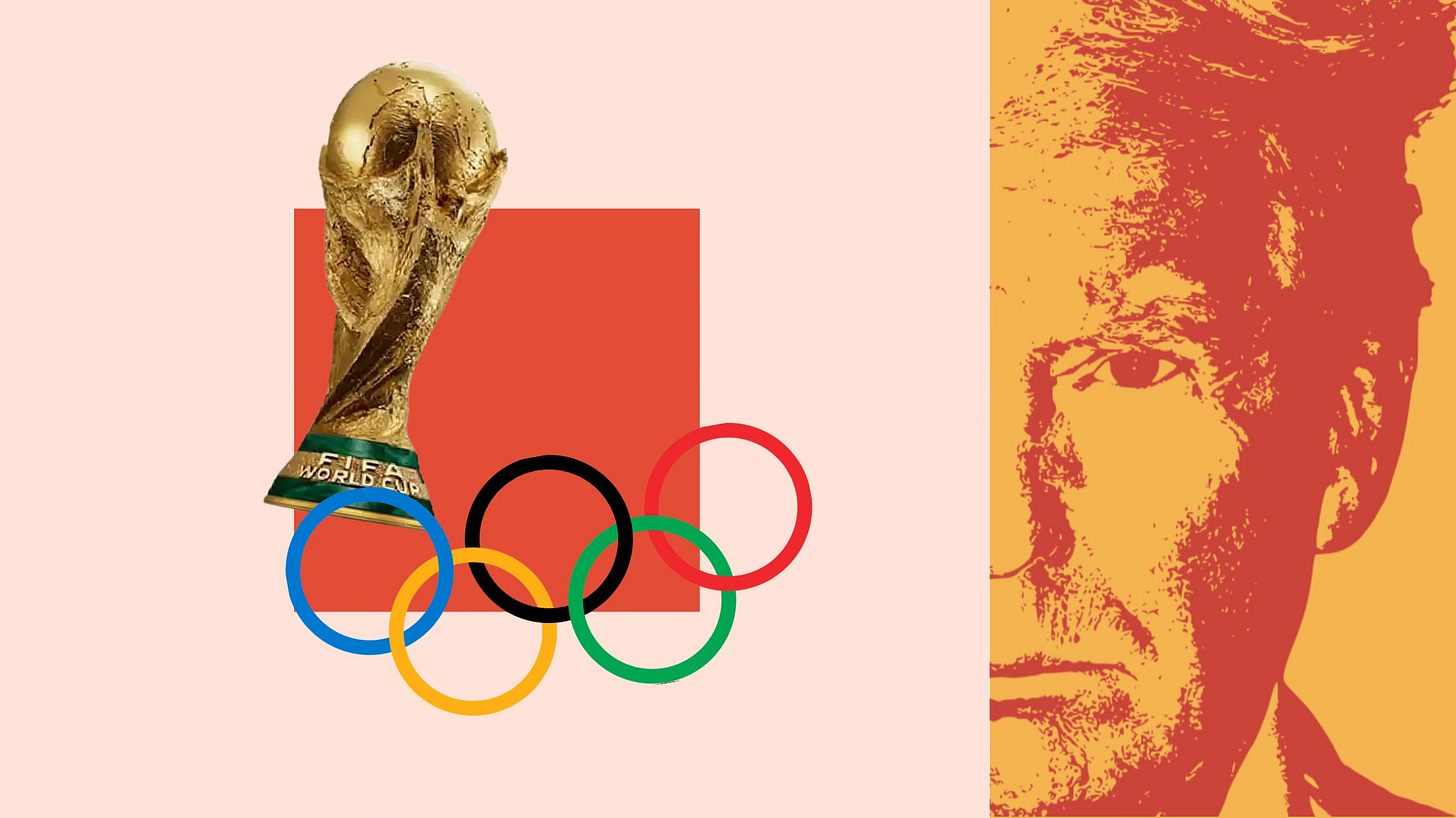Is Trump Ruining America’s Shot at the World Cup and Olympics?
How Trump's immigration policies might just bench us from hosting global events.
As we hurtle forward into the current political maelstrom, it's safe to say we're living in a moment where anything could happen—though unfortunately, it’s not the kind of “anything” that inspires confidence or hope. Trump and the GOP are gleefully accelerating their push toward a brand of nationalism that borders on the dystopian, while the Democrats continue to fumble in response, largely too concerned with finding their next soundbite to offer any real resistance. Meanwhile, in the midst of all this chaos, a less-than-ideal trend has begun to rear its ugly head: the dramatic uptick in deportations, targeting individuals with legal status, no criminal history, and sometimes no prior warning. Welcome to the United States of Fear.
Now, you might be thinking, “Sure, deportations are bad, but they’re not exactly a new phenomenon.” And you'd be right. But what’s new here is the sheer recklessness with which these policies are being executed—throwing people into maximum-security prisons in places like El Salvador over a harmless tattoo or a t-shirt. These are people with no criminal background, no history of violence, and no clear threat to national security, except, of course, that they’re immigrants who’ve dared to make a life here. One could almost hear Orwell rolling in his grave, as this current administration seems to be inspired more by the pages of 1984 than any principles of justice.
And that’s not the worst of it. Far from it. We’ve seen stories of students—some of them U.S. citizens and other with legal status in the U.S.—who’ve spoken out about Israeli government policies suddenly disappearing from campuses or facing deportation for what could only be described as the 'crime' of dissent. Remember Mahmoud Khalil? A Columbia graduate and green card holder who was taken by the U.S. gestapo for publicly criticizing Israel’s actions? Yeah, no big deal. It’s not like freedom of speech matters when your government is in the process of building a nationwide “us vs. them” mentality that treats even the slightest deviation from the status quo as subversion.
This isn’t just about ideological extremes or some shadowy conspiracy theory—it’s happening right now. Immigrants and visitors aren’t just dealing with red tape or bureaucratic delays; they’re facing something far more insidious: an outright climate of fear. It’s a systemic strategy designed to make everyone—from international students to cultural icons—second guess whether America is even worth the risk of visiting. So, here's the question: How long will it be before global events like the World Cup and the Olympics—two of the most significant international celebrations of culture, sport, and unity—start to feel the sting of Trump’s fear-based policies?
Let’s look at FKA Twigs, for example. The British musician had to cancel her Coachella appearance and nine other tour dates through June 25th, all because of—wait for it—“ongoing visa issues.” There’s nothing like a beloved artist having to pull out of major events to remind the world how friendly and welcoming the U.S. is to international talent. I mean, what better way to show the globe how open we are than by making it incredibly difficult for people with legal visas to even perform at one of the biggest festivals in the world?
Twigs’ story isn’t just a personal setback. It’s a shot across the bow of international cultural events. If an artist as well-known and well-respected as FKA Twigs can’t make it to a major event because of the arbitrary nature of the Trump administration's visa policies, imagine the ripple effect it will have on future global gatherings.
These policies don't just threaten the professional lives of artists; they undermine the very concept of cultural exchange, which is essential for things like the Olympics and World Cup. If global athletes, performers, and fans can’t reliably get their visas approved, why would they risk traveling to the U.S.? The fact is, America could find itself more isolated than ever in an era when international cooperation is key to everything from sports to diplomacy. Hosting major international events? That’s about to become a real headache, especially if potential participants are now faced with a system so unpredictable that it’s easier to get a seat on one of Elon’s rockets to Mars than to land a visa for a sports competition.
Let’s not kid ourselves here: this isn’t just about petty bureaucracy or a few logistical bumps in the road. We’re talking about the very real possibility that the U.S. could become the pariah of international events, all because the administration has weaponized fear in ways that directly harm its global relationships. And let’s face it, it’s hard to host the Olympics when the athletes can’t even get through customs without a security guard asking about their Twitter feed.
So, as we keep barreling toward the next round of global sporting events, one has to wonder: will any nation take the risk of bringing the world to the U.S. when we can’t even guarantee a smooth visa process for artists and athletes? Although we’re set to host, the U.S. could easily find itself being left off the invitation list to future global celebrations—not because the world hates America, but because we’ve made it so difficult for the world to even come here. Trump’s border policies might just be the reason we miss out on some of the most spectacular global moments of the next decade.





